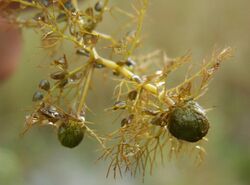Biology:Turion (botany)


A turion (from Latin turio meaning "shoot") is a type of bud that is capable of growing into a complete plant. A turion may be an underground bud.[1] Many members of the genus Epilobium are known to produce turions at or below ground level.[2]
Some aquatic plant species produce overwintering turions, especially in the genera Potamogeton, Myriophyllum, Aldrovanda and Utricularia. These plants produce turions in response to unfavourable conditions such as decreasing day-length or reducing temperature.
They are derived from modified shoot apices and are often rich in starch and sugars enabling them to act as storage organs. Although they are hardy (frost resistant), it is probable that their principal adaptation is their ability to sink to the bottom of a pond or lake when the water freezes. Because water expands anomalously at lower temperatures, water at 4 °C (39 °F) is denser than colder water, and thus stays at the bottom of the pond or lake. Turions overwinter in this denser, warmer water before rising again in the spring. Some turions of aquatic plants such as Potamogeton crispus also exhibit drought resistance, allowing them to survive in temporary pools.[3]
See also
- Bulbils, which may resemble turions, but include specialized storage leaves
- Hibernaculum (botany)
References
- ↑ Hickey, M.; King, C. (2001), The Cambridge Illustrated Glossary of Botanical Terms, Cambridge University Press, p. 44
- ↑ Hitchcock, C. Leo (Charles Leo), 1902-1986 (17 September 2018). Flora of the Pacific Northwest : an illustrated manual. Cronquist, Arthur,, Giblin, David,, Legler, Ben,, Zika, Peter F.,, Olmstead, Richard G. (Second ed.). Seattle. ISBN 978-0-295-74289-2. OCLC 1027726223.
- ↑ Adamec, Lubomír (2018). "Ecophysiological characteristics of turions of aquatic plants: A review". Aquatic Biology 148: 64–77. doi:10.1016/j.aquabot.2018.04.011.
- Sculthorpe, C. D. 1967. The Biology of Aquatic Vascular Plants. Reprinted 1985 Edward Arnold, by London. p. 346-364.
- Turion Overwintering Of Aquatic Carnivorous Plants, International Carnivorous Plant Society, Science Newsletter, June 1999 – Lubomír Adamec, Academy of Sciences of the Czech Republic, Institute of Botany. [1]
 |

